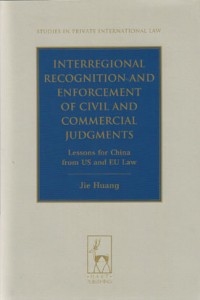Enhancing Mutual Trust – Codification of the European Conflict of Laws Rules: Some of the EU Commission’s Visions for the Future of EU Justice Policy
By Matthias Weller
Prof. Dr. Matthias Weller, Mag.rer.publ., Chair for Civil Law, Civil Procedure and Private International Law, EBS University of Economics and Law; Director of the Research Center for Transnational Commercial Dispute Resolution, EBS Law School
On 11 March 2014 the European Commission presented its vision for the future EU justice policy until 2020. In its Press Release “Towards a true European area of Justice: Strengthening trust, mobility and growth”, the Commission identifies three key challenges after the forthcoming end of the European Council’s Stockholm Programme on 1 December 2014: Enhancing mutual trust, facilitating mobility and contributing to economic growth. Against the background of the “Assises de la Justice” held in Brussels in November 2013 the Commission, by outlining its own vision of the future EU justice policy, intends to further feed the discussion on the way to the European Council on 24 June 2014. The most comprehensive document is the Communication on the EU Justice Agenda for 2020 – Strengthening Trust, Mobility and Growth within the Union (COM [2014] 144 final of 11 March 2014.
In this document the Commission, after summarizing the development of the European area of freedom, security and justice from Maastricht via Amsterdam and Nice to Lisbon as well as from the European Councils at Tampere via The Hague to Stockholm, further substantiates what it means by the three key challenges identified in its press release:
Firstly, “mutual trust” is evoked as the “bedrock upon which EU justice policy should be built”, namely by “building bridges between the different justice systems”, in particular by mutual recognition. Whereas the European legislator has so far simply postulated a sufficient degree of mutual trust amongst the Member States in order to justify obligations for mutual recognition in respect to the judicial cooperation in civil matters, the European Commission now is acknowledging that mutual trust must be strengthened or even built in the first place – a view that has up to now been taken only in respect to criminal matters. But with only 24% of people trusting their own national justice system for example in Slovenia, or 25% in Slovakia, it appears hardly possible to continue presuming a sufficient level of trust, let alone mutual trust.
In this context, the Commission suggests a new framework to safeguard the rule of law in the European Union. In its Communication to this proposal, the Commission explains that this framework is to operate as a “pre-Article 7 TEU procedure” addressing “systemic threats” to the rule of law consisting of three stages, namely a “rule of law warning” to be issued by the Commission to the respective Member State, a “rule of law recommendation” and on the third level a monitoring of the implementation of the recommendations before resorting to the “nuclear option” of Article 7 TEU that allows under certain conditions the suspension of (mainly voting) rights of Member States under the Treaties. The Commission makes crystal clear that its initiative is not meant to deal with individual breaches of fundamental rights or any miscarriage of justice in a particular case. Infringements of the rule of law other than “systemic” ones are to be taken care of – as before – by the national judicial systems including those provided for by the European Convention on Human Rights.
However, if some national judicial systems are perceived by the public or even evaluated by the Commission under its proposed pre Article 7 TEU procedure not to be sufficiently trustworthy, there is a problem both conceptually for building bridges through mutual recognition to the judicial system of such a Member State as well as for the individual suffering or threatened to suffer from a (non-systemic) violation of the rule of law in his / her particular case. One answer to the individual’s problem obviously is allowing exceptions to mutual recognition, i.e. public policy-clauses. Therefore, if the Commission is now acknowledging that there may be the need to strengthen mutual trust in respect to certain Member States, it would be contradictory to further pursue at the same time limitations or even deletions of public policy clauses as it was proposed for the Brussels I Recast. Rather, the Commission itself should trust the Member States that they do not misuse public policy exceptions. Mutual trust does not only operate horizontally but also vertically. It is difficult enough for the aggrieved party to argue and prove a case of violation of public policy. An obvious question not raised by the Commission in this context would be whether initiating pre Article 7 proceedings should affect in any way obligations of other Member States to recognize judicial acts from the Member State addressed by the Commission (possibly depending on the nature of observations made by the Commission), for example by reducing the degree of probability for public policy violations that must be shown in order to benefit from this exception of recognition.



